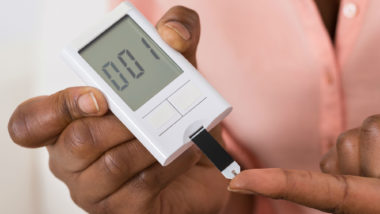 Diabetes can lead to a number of side effects such as nerve damage and poor circulation, which can in turn cause amputation due to infection.
Diabetes can lead to a number of side effects such as nerve damage and poor circulation, which can in turn cause amputation due to infection.
Why Does Diabetes Cause Amputation?
Diabetes is a serious cardiovascular disease that can cause lasting damage. In the long term, diabetic patients may be at risk for neuropathy (nerve damage) and circulation. These side effects can increase the risk of injury to the extremities – especially the feet.
When a diabetic person injures their feet, they may not be able to tell right away due to nerve damage. This means that a foot injury could go a long time without being properly cleaned and treated. On top of this, poor circulation can lead to decreased wound healing. This means that foot injuries may not heal fully, leading to diabetic foot ulcers.
Together, these factors mean that diabetic patients may get more foot ulcers and these sores may easily get infected. If an infection spreads too far, the only option may be to amputate the toe or part of the foot. In serious cases, the entire foot or lower limb may need to be amputated.
Taking certain diabetes medications, such as Farxiga, may also increase the chance of diabetic amputation. At least one study has shown that Farxiga and other medications like it are associated with an increased change of needing a diabetic foot amputation.
How Can You Protect from Diabetic Amputation?
The most important way to prevent diabetic amputation is to make sure that your diabetes is well managed and treated. Lower blood sugar levels will help mitigate some of the harmful diabetes side effects that can increase the chance of amputation.
Practicing regular foot care is another great way. The following foot care steps can help you prevent foot ulcers and seek prompt treatment if issues arise:
- Inspect your feet daily. Make sure to look for blisters, cuts, cracks, sores, redness, tenderness, or swelling.
- Wash your feet daily. Use lukewarm water and make sure to dry them carefully. You can also use a pumice stone to keep skin from developing calluses, talcum powder to keep the skin dry, and moisturizer to keep the skin from cracking.
- Do not remove calluses or lesions by yourself. A doctor or podiatrist should take care of these problems.
- Trim toenails regularly. Toenails should be trimmed straight across and sharp ends should be filed with an emery board.
- Don’t go barefoot. Even wearing slippers around the house can reduce the chances of injury.
- Buy shoes that fit. Comfortable shoes which provide support and cushioning can help keep your feet healthy.
- Schedule regular foot checks with your doctor at least once a year. Medical professionals can watch for signs of nerve damage, poor circulation, and other foot problems.
- Don’t be afraid to ask for help. If you’re unable to sufficiently care for your feet, ask a caregiver for assistance.
If you are taking Farxiga or another diabetes medication that may be linked with diabetes amputations and are concerned about your risks, speak with your doctor about changing your treatment plan. Never stop taking your diabetes medication without consulting your medical team.
If you or a loved one experienced diabetes amputation after taking Jardiance or Farxiga, you may have a legal claim and may be eligible to seek compensation from the drug maker for your medical and other expenses. Fill out the form on this page now to see if you qualify!
ATTORNEY ADVERTISING
Top Class Actions is a Proud Member of the American Bar Association
LEGAL INFORMATION IS NOT LEGAL ADVICE
Top Class Actions Legal Statement
©2008 – 2026 Top Class Actions® LLC
Various Trademarks held by their respective owners
This website is not intended for viewing or usage by European Union citizens.
Get Help – It’s Free
Join a Free Jardiance, Farxiga Diabetes Amputation Class Action Lawsuit Investigation
If you qualify, an attorney will contact you to discuss the details of your potential case at no charge to you.
If you took Invokana or Invokamet, you do not qualify for this investigation. Click here to join a separate class action lawsuit investigation.
PLEASE NOTE: If you want to participate in this investigation, it is imperative that you reply to the law firm if they call or email you. Failing to do so may result in you not getting signed up as a client or getting you dropped as a client.
E-mail any problems with this form to:
[email protected].
Oops! We could not locate your form.












